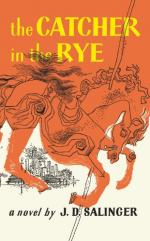|
|
The Catcher in the Rye Topic Tracking: Lies and Imagination
Chapter 1
Lies and Imagination 1: Holden, in his wish to "feel some kind of good-by" (pg. 16) before he leaves Pencey, shows himself to be concerned with the authenticity of his own feelings. He wants to use his imagination to feel more connected to the world and to his own emotions.
Chapter 3
Lies and Imagination 2: Holden's inability to stay enrolled in school isn't a result of a lack of imagination--he's a fan of good books and seems interested in learning from them. It's almost as if he has too much imagination for school. Though it's never directly said, we can assume from his performance on his essay test about the Ancient Egyptians that he loses patience with activities that don't seem to have a point and don't stimulate his imagination.
Chapter 5
Lies and Imagination 3: The report Holden writes for Stradlater about his brother Allie's baseball mitt, shows that Holden has a poetic imagination. Stradlater, who in all likelihood is not particularly poetic or imaginative, criticizes the report because a baseball mitt seems a pointless thing to describe.
Chapter 14
Lies and Imagination 4: A big part of Holden's trouble with movies is that they pollute peoples' imaginations. Holden seems to feel this is happening to him when he feels compelled to act like a movie character, gripping his side as if he's been shot, for example.
Chapter 18
Lies and Imagination 5: Holden's imagination isn't used just in the service of fantasies and escapism. When he's led to think about war after watching a war movie, he shows that he can also use this imagination to explore some issues with which he hasn't had any personal experience.
Chapter 20
Lies and Imagination 6: When Holden finally makes it to the Central Park lagoon to look for the ducks, he finds no evidence there to settle his curiosity about what these ducks do in the wintertime. This recurring concern about the ducks seems to be symbolic of Holden's desire for purpose and direction.
Chapter 22
Lies and Imagination 7: Holden's vision of himself as a catcher of children in a field of rye indicates that he hopes for a better fate for himself than that of a liar and a dropout. Using his imagination and telling lies is a fine survival technique for now, but he would ultimately like to have a role in making the world a better place.
Chapter 25
Lies and Imagination 8: It is unclear if Mr. Antolini really did have "perverty" intentions when he touched Holden's head in the night. When he wakes up the next morning, Holden thinks that maybe he did over-imagine things, that maybe Mr. Antolini's intentions were pure.
Lies and Imagination 9: Holden's vision of going West and becoming a deaf-mute gas station attendant indicates that his imagination is not quite in touch with reality.
Chapter 26
Lies and Imagination 10: Ultimately, Holden doesn't run away to the West. He ends up going home and becoming hospitalized, which is perhaps a big step for him towards learning to deal with the world rather than lie and imagine his way through difficulties.




